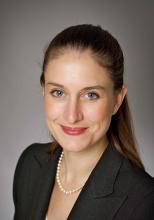French utility firm’s weather-dependent business means expectations are managed by keeping an eye on long-term targets
With assets displaying a 75-100 year lifespan, business at French utility major EDF is all about the long – or even very long – term. The IR department, led by Carine de Boissezon, works hand in hand with the sustainable development team in explaining short-term figures, such as carbon data, as part of a broader perspective.
‘Regarding carbon emissions, our advantage is our long track record,’ says Claude Nahon, the firm’s senior vice president of sustainable development. ‘Thanks to data going back to the early 1990s, we’re able to show that our strategy pays off in the long term, even if there is short-term variability.’
CO2 outputs will fluctuate depending on runoff and weather conditions. This past year, all metrics have been favorable, which has resulted in a very low level of emissions. But things can change pretty quickly. ‘Our message is credible because we put it in context: we know the great improvement we’ve had in 2014 won’t necessarily happen again in 2015,’ adds de Boissezon. ‘We set long-term goals based on the full knowledge of our activity. That’s also our strength: our ability to make projections on a very long timeframe for both financial and non-financial aspects.’
‘Transparency is key to explaining the reality of our business, which is weather-sensitive, so it’s affected by temperature, rainfall and light,’ Nahon explains. ‘We’ll sell more or less electricity depending on meteorological conditions. If we were capable of forecasting the weather for next summer, we’d be able to optimize our hydro reserves much more accurately!’
As part of its long-term initiative to finance energy transition projects, EDF announced last October a joint venture fund with European investment management giant Amundi. The utility firm also issued a green bond in November 2013, raising €1.4 bn ($1.5 bn) for EDF Energies Nouvelles’ wind, solar photovoltaic and biogas developments. ‘This shows a true shared construction on sustainable development issues that are closely linked to finance, and vice versa,’ Nahon enthuses, visibly proud of her ‘financial colleagues’ ability to innovate.’
With the issuance of interim statements suspected of promoting short-term thinking, an EU directive eventually allowed companies to drop quarterly reporting last year. When asked whether the change in regulation would affect EDF’s communications schedule, however, de Boissezon says it’s business as usual.
Her team conducts a conference call run by the CFO, frequently a 70-slide presentation on operational matters. ‘Our quarterly communications can seem disproportionally important with regards to the financial subject, which is revenue,’ de Boissezon notes. ‘We put out our top line figures quarterly, but not a full deck. A turnover figure for a utility company doesn’t say much about financial performance, again due to climate uncertainty, but our aim is to speak quarterly about the business and operational performance, so ultimately there are pretty few financial figures in those Q1 and 9 month presentations.’
It appears that most of the firm’s peer companies – with the notable exception of the UK’s National Grid – will also maintain their current rate of communications. ‘With the French financial regulator AMF recommending more transparency, putting an end completely to quarterly reporting would send out quite a negative signal to our investors,’ de Boissezon stresses, highlighting that this regular opportunity to talk about the business has proved a positive format overall for EDF.
‘Some companies that have been publishing full accounts might cut it to quarterly revenue only, but I’d be very surprised if companies stopped quarterly communications altogether,’ she continues. ‘Financial markets hate uncertainty. Our job is to give our audience the right elements to get where they expect us to be on the day of results. That’s what determines efficient IR: neither good nor bad surprises.’










